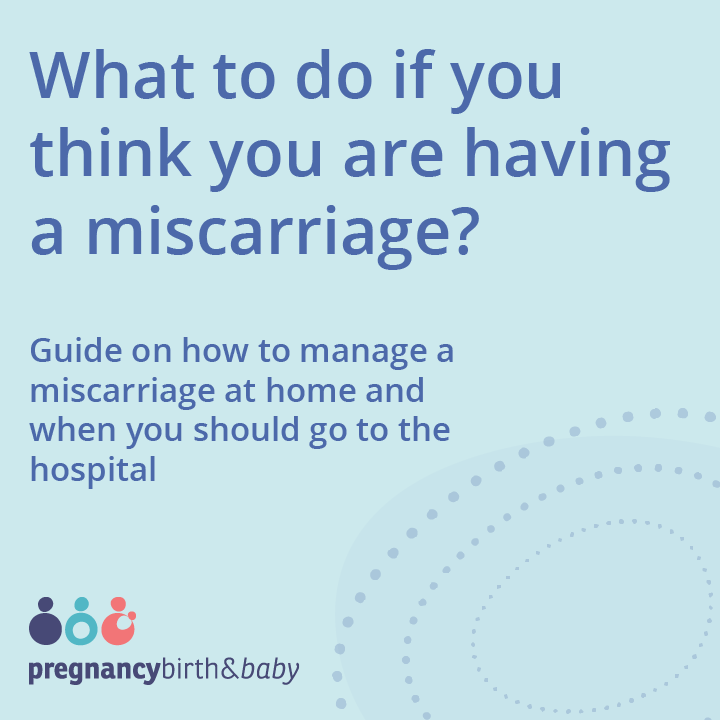What really happens during a miscarriage
6-minute read
WARNING — This article contains some graphic descriptions of what you might see during a miscarriage.
If you think you are having a miscarriage, call your doctor or midwife immediately to ask what to do. If you have heavy bleeding, strong pain or feel unwell, call triple zero (000) and ask for an ambulance.
Key facts
- Vaginal bleeding is usually the first sign of miscarriage, followed by lower abdominal (tummy) pain.
- Vaginal bleeding during pregnancy is not always due to a miscarriage, but if you are bleeding, speak to your doctor, midwife or call your nearest hospital emergency department.
- Depending on how many weeks pregnant you are, you may see clots and tissue or the form of a small baby if you have a miscarriage.
- Support is available for you and your partner if you experience a miscarriage.
What does a miscarriage feel like?
A miscarriage often causes vaginal bleeding. This could range from light spotting to heavy bleeding. It can also cause cramping and lower abdominal (tummy) pain. As a miscarriage progresses, you may also pass blood clots from your vagina.
Spotting or bleeding during pregnancy doesn't always mean you are having a miscarriage, but if you notice bleeding, speak to your doctor or midwife immediately.
Some people only have mild symptoms, or no symptoms at all, and find out they have had a miscarriage at a routine pregnancy visit or ultrasound.
It is normal to feel very worried if you think you are having a miscarriage.
What should I do if I think I’m having a miscarriage?
If you think you are having a miscarriage, call your doctor or midwife straight away. They can tell you if you need to go to hospital, and can arrange tests to see what is going on. Their advice will depend on your symptoms and services available in your area.
Go to your nearest hospital emergency department or call triple zero (000) and ask for an ambulance if:
- you have heavy vaginal bleeding (soaking more than 2 pads per hour or passing large clots)
- you have severe pain in your abdomen
- you feel very unwell
FIND A HEALTH SERVICE — The Service Finder can help you find doctors, pharmacies, hospitals and other health services.
What happens during a miscarriage?
Unfortunately, nothing can be done to stop a miscarriage once it has started. Treatment is important to help manage your health if you have heavy bleeding or an infection.
How long the miscarriage process takes depends on the management pathway you and your doctor or midwife decide on. Options include:
- expectant management — waiting for the pregnancy tissue to pass by itself
- medical management — taking medicines to help your body pass the pregnancy tissue
- surgical management — a surgical procedure to empty your uterus
While you are waiting for a miscarriage to finish, it's best to rest at home and do what feels right for you. You can use paracetamol for your pain. If you are bleeding, use sanitary pads instead of tampons to lower the chance of infection.
What will I see during a miscarriage?
The type of pregnancy tissue you might see depends on how many weeks pregnant you were when the miscarriage occurred. It may look like blood clots, or you may be able to see membranes or tiny body parts.
What happens after a miscarriage?
After a miscarriage, bleeding will get lighter over time and will usually stop within 2 weeks.
Signs of pregnancy, such as nausea and tender breasts, will go away after the miscarriage. If you had a miscarriage close to 20 weeks of pregnancy, your breasts might produce some milk.
You will usually have your next period within 4 to 6 weeks.
Emotional effects
It is normal to feel a range of different emotions at this time. There is no right or wrong way to feel.
It may help to talk to loved ones or others who have experienced pregnancy loss. Some people find it helpful to seek counselling.
Find out more about coping after miscarriage from ForWhen.
Resources and support
If you have experienced a miscarriage or pregnancy loss, there are many support services available to help you, your partner and your family. Find a service that is right for you.
Speak to a maternal child health nurse
Call Pregnancy, Birth and Baby to speak to a maternal child health nurse on 1800 882 436 or video call. Available 7am to midnight (AET), 7 days a week.
